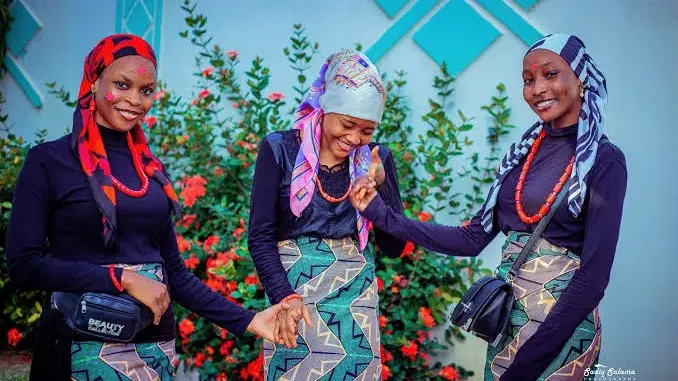
Just days before another wedding season in Kano, the joy of brides and their village-themed celebrations has been cut short.
On May 17, 2025, the Kano State Censorship Board announced a statewide ban on Kauyawa Day over alleged indecent behavior among young women.
“Kauyawa Day” is a traditional cultural event celebrated primarily in northern Nigeria, especially among Hausa communities.
The term “Kauyawa” translates to “villagers” in Hausa, reflecting the event’s emphasis on rural customs and aesthetics. Typically held a day or two before a wedding, Kauyawa Day is organized by the bride’s female friends and relatives where participants dress in traditional village attire, engage in singing and dancing, and showcase local foods.
The board however revealed that the decision to enforce the ban was made to safeguard “societal values” and prevent what it described as “unacceptable behavior.”
As part of the new measures, event venues and party halls are prohibited from hosting any activities linked to “Kauyawa Day” until existing regulations are reviewed and updated.
“The Board will work closely with security agencies to ensure strict enforcement of the law.
“Local vigilante groups and the Hisbah Board will also be mobilized to support compliance efforts. In addition, the Board plans to engage community elders and youth groups to raise awareness and encourage public support for the policy,” the board said in a statement.
The move has sparked some mixed reactions from residents raising concern on whether culture being protected or erased.
Fatima Muhammad, a resident of Darmanawa, expressed deep disappointment over the recent ban on Kauyawa Day in Kano State.
Speaking to Daily Post, she revealed that the cancellation of the event had caused her emotional distress, especially as her best friend’s wedding was approaching.
“This is the only time we women truly enjoy ourselves during weddings.”
She explained that women usually prepare weeks in advance for Kauyawa Day, selecting traditional attire, composing songs, and rehearsing dances that reflect village life.
“It’s our way of expressing joy, our nishadi,” she added.
She acknowledged that while some individuals may engage in behavior that goes against cultural norms during Kauyawa Day, that should not justify denying others the opportunity to celebrate in a decent and joyful manner.
Rabiu Musa, a resident of Farawa, described the ban on Kauyawa Day as unjust and called for its immediate reversal.
“This decision is quite wrong and should be reversed without delay. We must raise our voices collectively to ensure it is overturned.”
Rabiu criticized the move as an attempt at cultural homogenization, warning that it could lead to the erosion of Hausa identity.
“While global communities are promoting cultural creativity, what the Kano State Government is doing amounts to cultural homogenization,” he explained.
“It is making people lose touch with their cultural practices and beliefs. The creativity behind events like Kauyawa Day adds value and brings life to our fast-eroding traditions.”
He further emphasized the broader implications of the ban on cultural preservation.
“What the government is trying to do will eradicate our cultural norms and values, and ultimately, our total identity,” he said.
“Every community has its identity, and that identity is kept alive through cultural programs and events.”
Rabiu described Kauyawa Day as one of the defining elements of Hausa wedding celebrations.
“These events remind people of who they are, where they come from, and their rich cultural heritage,” he added.
“Kauyawa Day is one of the unique aspects of Hausa weddings that distinguishes them from Western culture. It’s part of what makes our weddings truly special.”
He concluded by urging the government to reconsider.
“This decision is uncalled for and should be reversed immediately,”he added.
However, supporters of the ban, including some clerics and traditionalists, argue that Kauyawa Day has strayed too far from its original purpose.
Nazeeru Dalhat, a resident of Ghari LGA, said the ban on Kauyawa Day was long overdue.
“This decision should have come much earlier. The way Kauyawa Day is celebrated today goes against our culture and traditions as Hausas.”
He expressed concern over the behavior of some participants, particularly from rural communities.
“Women now hide under the guise of Kauyawa to engage in acts that contradict our customs, from their outfits to their dances and overall conduct,” he said.
Nazeeru warned that allowing the celebrations to continue unchecked could have damaging effects on Hausa values.
“If this is allowed to continue, it will corrupt the character and behavior of our people,” he added. “I support the ban 100%.”
Nazir Nuhu, an Islamic scholar, in Mariri supported the ban on Kauyawa Day, stating that the practice is not rooted in Islam but rather in cultural traditions that have been adopted over time.
“Kauyawa Day is not Islamic,” he said. “It is purely a cultural practice, not something backed by Sharia.”
He commended the Kano State Censorship Board for taking action, describing the move as a step towards sanitizing society.
“This is a commendable effort to restore moral discipline. The Prophet (peace be upon him) said: ‘Whoever sees something wrong should change it with his hand; if he cannot, then with his tongue; and if he cannot, then with his heart.’”
Nazir emphasized that the nature of Kauyawa Day activities clearly contradicts Islamic values.
“Just look at how they dress during these events. It is far from modest,” he added.
“It hasn’t even been long since this trend started, yet it’s already causing moral decay. Stopping it now is the right decision.”
Ultimately, the ban on Kauyawa Day highlights the ongoing tension between cultural preservation and moral regulation in Kano.
As voices continue to rise both in support and opposition, the decision raises important questions about who defines culture and who gets to celebrate it. While the government insists it’s protecting societal values, many argue that suppressing such traditions risks erasing the identity of the people. Whether reviewed or upheld, the decision will leave a lasting impact on how culture is celebrated in Kano.
